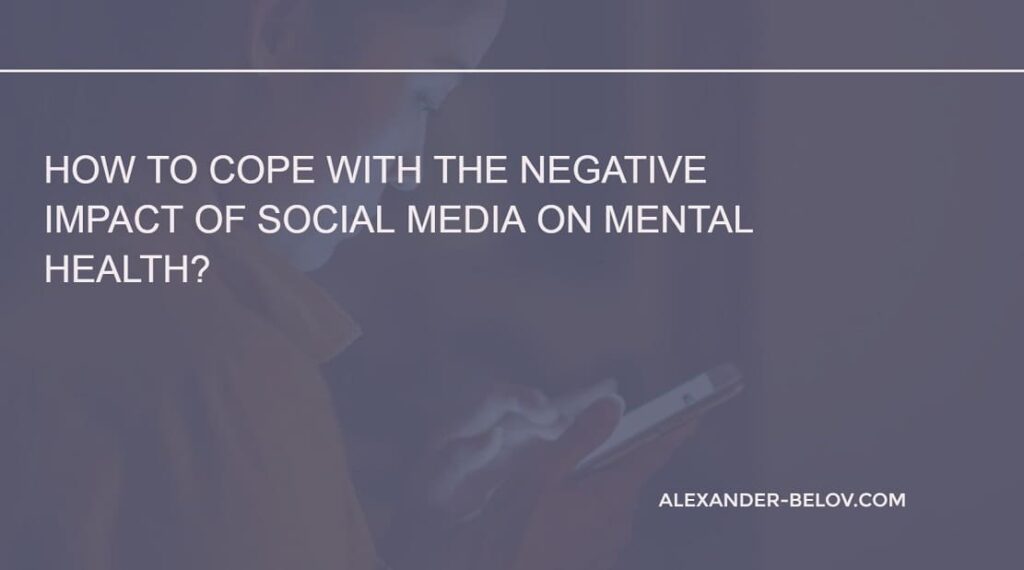How to cope with the negative impact of social media on mental health?
In our modern digital era, social networks have become an integral part of our lives. They provide us with the opportunity to stay connected with friends and loved ones, share experiences, receive information, and be entertained. However, despite all their advantages, social networks also have a negative impact on our mental health.

One of the main factors influencing mental health through social networks is constant comparison. When we browse through other people’s profiles, we involuntarily compare our lives to their idealized representations. This can evoke feelings of dissatisfaction and self-discontent. We begin to doubt our achievements, appearance, and lifestyle, which can lead to the development of inferiority complexes and depression.
The second factor influencing mental health through social networks is addiction to scrolling. We often get immersed in an endless stream of content, scrolling through the news feed without stopping. This creates dependency and distracts us from important tasks. We spend a lot of time on social networks instead of actively engaging in our own affairs. This can lead to decreased productivity, increased stress levels, and deteriorating mental well-being.
The third factor influencing mental health through social networks is the lack of genuine connection. Virtual relationships cannot replace real relationships and genuine support from other people. We may have thousands of “friends” on social networks, but still feel lonely and isolated. This can lead to the development of social anxiety and worsening emotional state.
So, how can we deal with the negative impact of social media on our mental health? Here are some tips and recommendations for time management:
- Determine priorities: identify your most important tasks and commitments. Focus on them and try to minimize the time spent on social media.
- Set limits: establish time frames for using social media. For example, decide that you will only spend 30 minutes a day on them and stick to this schedule.
- Disable notifications: turn off notifications from social media on your mobile phone or computer. This will help you focus on the current task and avoid constant interruptions.
- Take social media breaks: set periods when you will completely disconnect from social media. For example, decide not to use them for an hour before bedtime or during lunch breaks.
- Find alternative ways of communication: try to establish more authentic and deeper connections with other people in real life. Meet friends in person, communicate over the phone, or spend time outdoors.
- Be mindful content consumers: when browsing content on social media, be mindful and critical. Don’t believe everything you see and don’t compare yourself to idealized images of others.
- Create a positive online environment: Surround yourself with uplifting and inspiring content on social media. Unfollow accounts that make you feel anxious, jealous, or inadequate. Instead, follow accounts that promote positivity, self-care, and mental well-being.
- Engage in offline activities: Dedicate time each day to activities that do not involve social media. This could include hobbies, exercise, reading, or spending quality time with loved ones. Engaging in offline activities will allow you to focus on the present moment and reduce the temptation to constantly check social media.
- Practice self-care: Prioritize self-care activities that promote mental health and well-being. This could include meditation, journaling, practicing gratitude, or engaging in relaxation exercises. Taking care of yourself will help reduce stress and improve your overall mental health, making you less susceptible to the negative effects of social media.
- Seek support: If you find that social media is significantly impacting your mental health, consider reaching out for support. Talk to a trusted friend, family member, or mental health professional who can provide guidance and assistance. They can help you navigate the challenges of social media and provide strategies for maintaining good mental health.
- Use social media for positive purposes: Instead of mindlessly scrolling through social media, use it as a tool for personal growth and learning. Follow accounts that provide educational content, motivational quotes, or resources for personal development. Engaging with positive and informative content can help shift your perspective on social media and make it a more beneficial and enriching experience.
- Practice digital detoxes: Regularly take breaks from social media by implementing a digital detox. This could be a day, a weekend, or even a week-long break from all social media platforms. Use this time to reconnect with yourself, focus on your mental well-being, and engage in activities that bring you joy and fulfillment.
By implementing these tips and recommendations, we can regain control over our social media usage and protect our mental health. Remember, it’s important to prioritize our well-being and find a healthy balance between the digital world and the real world.
In conclusion, social media can have a negative impact on our mental health, but we can take measures to minimize it. Practicing time management and using social media consciously will help us maintain our mental health and enjoy the benefits of the digital era.



